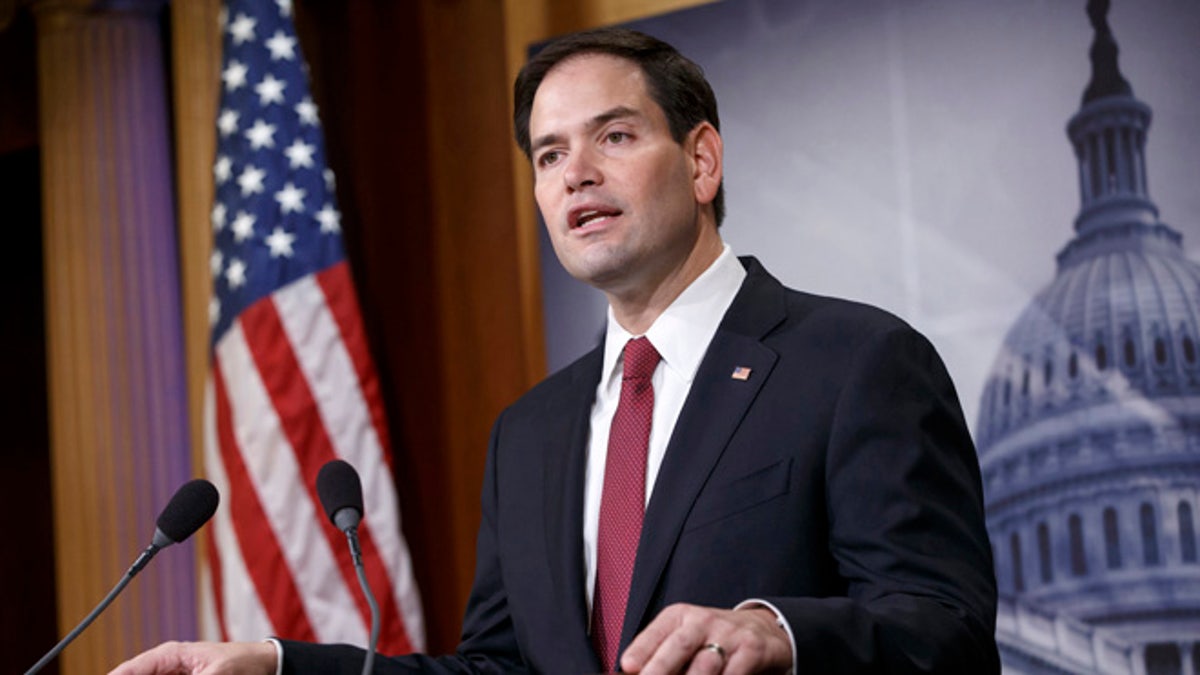
FILE - In this Dec. 17, 2014 file photo, Sen. Marco Rubio, R-Fla. speaks on Capitol Hill in Washington. Rubio seems to be moving toward a bid for the Republicans' presidential nomination, and late Sunday he joins Sens. Ted Cruz of Texas and Rand Paul of Kentucky for an audience with the conservative billionaire Koch brothers. (AP Photo/J. Scott Applewhite, File)
U.S. Senator Marco Rubio is asking Secretary of State John Kerry to call for an “independent, internationally assisted investigation” into the suspicious death of an Argentinian prosecutor assigned to look into the 1994 bombing of a Jewish community center in Buenos Aires, the nation's deadliest terror attack ever.
The Florida senator said Alberto Nisman’s unfinished work could have implications on U.S. national security and it is imperative that the U.S. make sure his death is adequately investigated. Nisman was probing whether Argentina struck a deal to receive cheap oil from Iran and in return would shield the Iranians involved in the bombing from prosecution. Iran would also receive beef and grains from Argentina.
“The suspicious death of Alberto Nisman, Argentina’s Special Prosecutor investigating the 1994 terrorist attack against the Argentine Jewish Mutual Aid Society (AMIA) in Buenos Aires, deserves greater attention by this Administration,” Rubio wrote in the letter to Kerry. “I am increasingly concerned about the ability of the Government of Argentina to conduct a fair and impartial investigation into his death, or its capacity to ensure the independence of a prosecutor that would continue Mr. Nisman’s decade-long work. I thus urge the Administration to support the establishment of an independent, internationally assisted investigation into Mr. Nisman’s suspicious death.”
Rubio said it was imperative that the U.S. understand the questionable relationship between Iran and Argentina.
“As you intensify discussions with the Iranian regime, including with some officials whose names have surfaced in Mr. Nisman’s work, it is more important than ever for the American public and lawmakers to clearly understand the nature of Iran’s activities in our own hemisphere, now as well as in the past,” he said.
Last week, Sen. Bob Menendez, the ranking member of the Senate Foreign Relations Committee, also called for a full investigation into Nisman’s death.
Menendez requested that the U.S. State Department and the U.S. Embassy in Buenos Aires press the Argentinian government to provide answers regarding his death.
Nisman was found dead on Jan. 18 in his Buenos Aires apartment. He was lying on the bathroom floor next to a .22-caliber handgun and a bullet casing.
While his death was originally ruled a suicide, family and friends of Nisman – as well as President Cristina Fernández de Kirchner – rejected the finding, while protesters took to the streets demanding justice for the prosecutor.
"President Fernández de Kirchner's announcement that Mr. Nisman's death was not a suicide raises troubling new questions," Menendez said in a statement last week. "The increasingly suspicious conditions surrounding Mr. Nisman’s death, just hours before he was scheduled to testify before the Argentine Congress, demand a thorough and transparent investigation."
In an interview last week with Fox News Latino, Menendez said he is pursuing briefings about the Iran-related allegations.
“The circumstances around the prosecutor and my longtime concerns about what has happened to the Jewish community in Argentina make me seriously concerned about all of these reports [about Iran’s role] that are out there,” Menendez said.
He added that Iran’s forays into the Western Hemisphere in order to expand its influence is in itself worrisome.
“This is a state sponsor of terrorism in our own hemisphere,” Menendez said about Iran.
Nisman’s report on the AMIA case, which was released after his death, revealed intercepted conversations between representatives of the Iranian and Argentinian governments that point to a long pattern of secret negotiations between the two nations.
From the beginning, on social media and throughout the world, many questioned whether Nisman killed himself.
No suicide note was found and a test of Nisman's hand showed no gunpowder residue, though investigators said that may have been due to the small caliber of the gun.
Also feeding suspicion was the rapid appearance of national Security Secretary Sergio Berni at the apartment, since he is a government – and not a judicial – official. He denied allegations that he altered the crime scene.
Then the locksmith who opened the back door to give investigators access to Nisman's apartment said it hadn't been properly locked, raising speculation about whether a killer might have entered or exited the 13-story dwelling.




